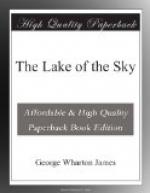CHAPTER XIX
DEER PARK SPRINGS
While in one sense all the resorts of the Tahoe region are mountain resorts, a difference should be noted between those that are located directly on the shores of Lake Tahoe, or some lesser lake, and those that are away from immediate proximity to a lake. The latter type is more correctly designated mountain resorts, and of these are three in the Tahoe region, viz., Deer Park Springs, Rubicon Springs and Glen Alpine. All these resorts were discovered by following the trails of animals which were visiting them for “salt licks” that existed in connection with their mineral waters as related in the chapter on Glen Alpine.
Deer Park is a private estate of approximately 469 acres, in two sections, one the Mineral Springs Section, consisting of nearly 309 acres, and on which the celebrated springs—two of soda, one of sulphur, and one of iron—are located, and the other, the Five Lakes Section, of 160 acres. The former begins a mile from the Truckee River, up Bear Creek Canyon. This was originally taken up from the Government as timber claims, but the timber has never been cut, and the great pines, firs and junipers remain as the original settlers found them. The Five Lakes section is a fascinating and attractive location two miles away, over the first divide of the mountains, and therefore 1000 feet higher than the Inn, where five glacial lakes nestle in their granite basin. Four of these, and a large part of the fifth, are included in the estate, while all surrounding is government land of the Tahoe National Forest. If a dam were built to restrain the flow of water into Five Lake Creek, it would need only to be ten feet high to convert the five lakes into one, so near are they to the same level.
As it is the flow from these lakes forms Five Lakes Creek, which empties into the Rubicon and thence into the South Fork of the American.
Five Lakes afford excellent fishing and a log-cabin, three boats and fishing tackle are kept here throughout the season for the pleasure of guests. Those who disdain the ordinary accommodations of a hotel can here camp out, rough it, and make it their headquarters while climbing the adjoining peaks or exploring the ravines and canyons at the head of the American River.
In 1914 a student from Stanford University was host at the Five Lakes log-cabin. He cooked for those who desired it, helped gather fir boughs for camp beds, prepared fishing-tackle for women anglers, rowed them to and fro over the lakes, and accompanied parties to the nearby summits. There are full accommodations at the cabin for seven persons, and the rule of the camp is that guests stay only one night, moving on to make room for the next comer, unless arrangements for a longer stay are made beforehand. Thus all the guests at Deer Park Inn may enjoy this novel experience if they so desire.




